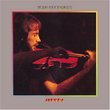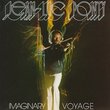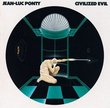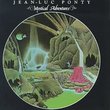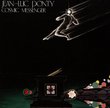| All Artists: Jean-Luc Ponty Title: Upon the Wings of Music Members Wishing: 3 Total Copies: 0 Label: Collectables Release Date: 11/5/2002 Genres: Jazz, Pop Style: Number of Discs: 1 SwapaCD Credits: 1 UPC: 090431633021 |
Search - Jean-Luc Ponty :: Upon the Wings of Music
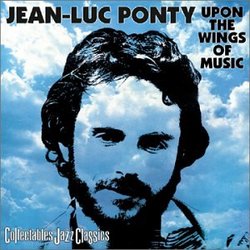 | Jean-Luc Ponty Upon the Wings of Music Genres: Jazz, Pop
Jean-Luc Ponty came to the United States in 1967 on the recommendation of John Lewis of the Modern Jazz Quartet for a performance at the Monterey Jazz Festival. Over the course of his career, he performed and/or recorded ... more » |
Larger Image |
CD DetailsSynopsis
Album Description Jean-Luc Ponty came to the United States in 1967 on the recommendation of John Lewis of the Modern Jazz Quartet for a performance at the Monterey Jazz Festival. Over the course of his career, he performed and/or recorded with keyboardist George Duke and Frank Zappa's Mothers of Invention, and was a longtime sideman in John McLaughlin's Mahavishnu Orchestra. His first Atlantic LP, "Upon The Wings Of Music," released in 1975, is the subject of this CD reissue. Similar CDs
|
CD ReviewsJLP's Promising Fully Electric Starter P. McKenna | Atlanta GA | 09/22/2004 (4 out of 5 stars) "While still in the Mahavishnu Orchestra MK II, Jean Luc concocted his first solo outing. While not as fully realized as subsequent albums, this at least strongly pointed the way he would be heading shortly. The opening title track with its insistent drumming by Ndugu Leon Chancellor roars out of the gate with Ponty soaring over the top of the maelstrom, beautifully constructed melody here! "Question With No Answer" features a beautiful plaintive piano intro from Patrice Rushen just before Jean Luc enters with the song's probing, insistent melody, gradually building momentum as the full band enters to a rousing conclusion. "Now I Know" is a moody ballad with dreamy Herbie Hancock-esque Rhodes from Patrice as Jean-Luc spins out haunting melodies. Things pick up again with "Polyfolk Dance" featuring some cool odd-meter passages. One thing the album as a whole is lacking in is strong guitar work (the contributions of Dan Sawyer and Ray Parker Jr. are at best serviceable and generic), the solo on here is a bit cliched and irritating with its angry mosquito tone. Also featured is a solo violin piece "Echoes Of The Future" with Ponty employing an Echoplex for layering figures on top of one another, something that would become one of his trademarks. The rest of the tracks are decent enough fusion, but in subsequent albums, Ponty's compositional prowess would grow like mad. A good solid start, all told." A cult recording! Hiram Gomez Pardo | Valencia, Venezuela | 10/01/2007 (5 out of 5 stars) "
Jean Luc Ponty' s debut could not be more successful. In 1975, there were two admirable soloists of the instrument in stage : Don Sugar Cane Harris, with his musical offer that went from the folk to blues, and Stephan Grapelli, a living legend of the instrument. But the main contribution of Ponty consisted in narrowing and reaffirming the bounds between the violin and the traditional jazz instruments, making the violin literally dissolved in the musical speech, and just remarking his tonalities, between the different ideas, and making the violin became a rhythmic and dynamic device. Of course we had to mention the use of the violectra solo in re-recording in the moving and expressive "Echoes of the future." "Upon the wings of the music" was by far his main presentation card , but "Question without answer" , but in particular the piece "Waving memories" is a mesmerizing track that combines lyricism and vibrating beating. Ndugu ( leaon Chancler) is terrific in the percussion, drums, Roto toms and Remo. Kudos too for Ralphe Armstrong in guitar and electric bass, Don Sawyer and electric guitar except in Fight for life and finally the presence of Ray Parker in electric c guitar. But the only and irrefutable fact this album has surmounted the test of time and still is in the privileged position of being in the privileged place among the first 8300 albums, after thirty two years from being released, taking into account the impressive transition of the jazz with the appearing of such admirable soloists as Dvae Crusin, Bob James, Ramsey Lewis, Earl Klugh, George Benson in traditionally accepted instruments in jazz (Take into account the Seventies was the decade of the piano as prominent star, the Sax in the eighties and the guitar in the nineties) makes of this artistic triumph a true musical phenomena. Please, go for your favorite CD store and listen it, you will not be able to resist this amazing proposal. " |

 Track Listings (8) - Disc #1
Track Listings (8) - Disc #1